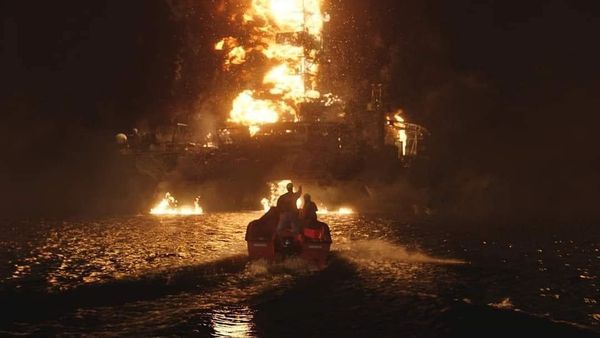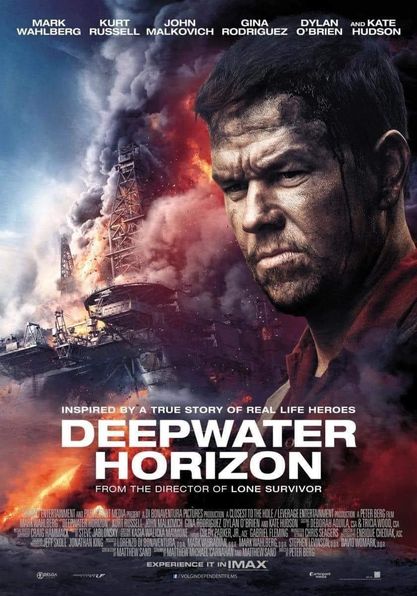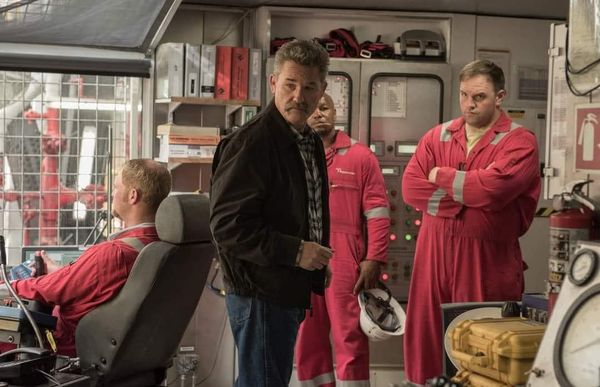Deepwater Horizon (2016)

Deepwater Horizon (2016), directed by Peter Berg and starring Mark Wahlberg, is a gripping disaster film based on the true events of the 2010 Deepwater Horizon drilling rig explosion, one of the worst environmental disasters in U.S. history. The film portrays the heroic actions of the crew members as they faced a catastrophic blowout that led to the destruction of the rig and a massive oil spill in the Gulf of Mexico.

The film follows Mike Williams (Mark Wahlberg), the chief electronics technician aboard the Deepwater Horizon, and his colleagues as they contend with mounting pressures from BP executives to cut corners in order to expedite drilling operations. These decisions lead to a series of technical failures, culminating in the catastrophic blowout.
Wahlberg delivers a strong, everyman performance as Williams, grounding the film in the perspective of an ordinary man caught in extraordinary circumstances. Kurt Russell also shines as Jimmy Harrell, the rig’s tough but fair-minded supervisor. Gina Rodriguez, as Andrea Fleytas, and John Malkovich, as BP executive Donald Vidrine, round out the solid cast, each contributing to the tension and drama.

Peter Berg’s direction is tight and focused, effectively building suspense as the situation on the rig deteriorates. The film does an excellent job of immersing the audience in the chaotic, claustrophobic environment of the drilling rig. The use of practical effects and set design adds a visceral realism to the disaster sequences, making the destruction feel tangible and terrifying.
The cinematography by Enrique Chediak captures both the grandeur and the danger of the rig, with sweeping shots of the massive structure juxtaposed against the intimate, high-stakes moments of the crew’s struggle for survival. The sound design also deserves praise for its role in creating an intense, almost overwhelming atmosphere, particularly as the rig begins to fail.
Deepwater Horizon is more than just a disaster movie; it also serves as a critique of corporate greed and the consequences of placing profit over safety. The film highlights the human cost of these decisions, focusing on the bravery and sacrifice of the crew members rather than simply depicting the disaster for spectacle.

The tone is somber and respectful, paying tribute to the real-life individuals involved in the tragedy. The film avoids sensationalism, instead opting for a more grounded portrayal of the events. This approach ensures that the emotional impact of the disaster is felt by the audience, especially in the closing scenes, which emphasize the personal toll on the survivors and the families of those who were lost.
While Deepwater Horizon succeeds as a tense, well-crafted disaster film, some viewers might find its character development lacking. The focus on the technical aspects of the disaster and the action sequences sometimes overshadows the opportunity to delve deeper into the personal lives of the characters. As a result, some of the emotional beats may not land as strongly as intended.
Additionally, the film’s pacing is deliberate, with a build-up that might feel slow to some viewers. However, this approach ultimately pays off, as it effectively establishes the stakes and the inevitable, tragic outcome.
Deepwater Horizon is a powerful, well-made film that combines intense action with a poignant message about the dangers of corporate negligence. Mark Wahlberg’s strong lead performance, along with Peter Berg’s skillful direction, makes this a compelling watch for fans of disaster films and those interested in real-life stories of heroism.

Watch movie:











